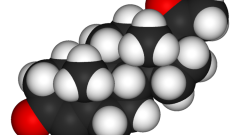Progesterone is a steroid hormone that is responsible for proper menstrual cycle, pregnancy and embryogenesis. He belongs to a group of hormones called "progestogen". Also progesterone is involved in the production of sex hormones and corticosteroids.
Women in the phase of the cycle preceding ovulation, the progesterone level is relatively low. Before ovulation the concentration of progesterone in the blood is less than two nanograms per milliliter, and after ovulation increases to five nanograms per milliliter and above. In the case of pregnancy the progesterone level rises to 100-200 nanograms per milliliter of blood.
Progesterone affects the serotonin receptors in the brain, so an excess or deficiency of this hormone leads to a significant change in mental state.
Symptoms of low progesterone levels, also called luteal insufficiency, is the inability to become pregnant and carry a fetus to term. Another symptom of luteal insufficiency is a short menstrual cycle.
At low concentrations of progesterone in the blood, there is breast tenderness and excess male hormones. The last factor can lead to acne, skin pigmentation and fluctuations in blood pressure.
Modern medicine in the determination of inadequate progesterone levels is based on several characteristics:
- Abnormal response of the endometrium on change of a hormonal background
Low progesterone levels on the 7th day after ovulation
- Shortened the second phase of the menstrual cycle, component is not more than 12 days
- The lack of a pulsating production of progesterone in the female body
Progesterona failure relieved with the intake of gonadotropins, especially in the periods following the induction of ovulation. Also used injections of progesterone. It should be noted that the use of products containing progesterone, is not effective. This is because a lack of progesterone in the body occurs in the background of many adverse factors. As a result, compensation of the lack of this hormone through injections is temporary. Many doctors agree on the opinion that in most cases, when women are diagnosed with luteal insufficiency, the use of progesterone is not effective and justified.
Dynamics of the level of progesterone in the female body
Women in the phase of the cycle preceding ovulation, the progesterone level is relatively low. Before ovulation the concentration of progesterone in the blood is less than two nanograms per milliliter, and after ovulation increases to five nanograms per milliliter and above. In the case of pregnancy the progesterone level rises to 100-200 nanograms per milliliter of blood.
Progesterone affects the serotonin receptors in the brain, so an excess or deficiency of this hormone leads to a significant change in mental state.
Signs of lack of progesterone
Symptoms of low progesterone levels, also called luteal insufficiency, is the inability to become pregnant and carry a fetus to term. Another symptom of luteal insufficiency is a short menstrual cycle.
At low concentrations of progesterone in the blood, there is breast tenderness and excess male hormones. The last factor can lead to acne, skin pigmentation and fluctuations in blood pressure.
Diagnosis progesterone insufficiency
Modern medicine in the determination of inadequate progesterone levels is based on several characteristics:
- Abnormal response of the endometrium on change of a hormonal background
Low progesterone levels on the 7th day after ovulation
- Shortened the second phase of the menstrual cycle, component is not more than 12 days
- The lack of a pulsating production of progesterone in the female body
Treatment of luteal insufficiency
Progesterona failure relieved with the intake of gonadotropins, especially in the periods following the induction of ovulation. Also used injections of progesterone. It should be noted that the use of products containing progesterone, is not effective. This is because a lack of progesterone in the body occurs in the background of many adverse factors. As a result, compensation of the lack of this hormone through injections is temporary. Many doctors agree on the opinion that in most cases, when women are diagnosed with luteal insufficiency, the use of progesterone is not effective and justified.








